新译林牛津版初中英语九年级上册Unit 3 Teenage problems reading 2优质课公开课教案(2)
牛津译林版英语九年级上册 Unit 3 《Teenage problems.》 教学设计5
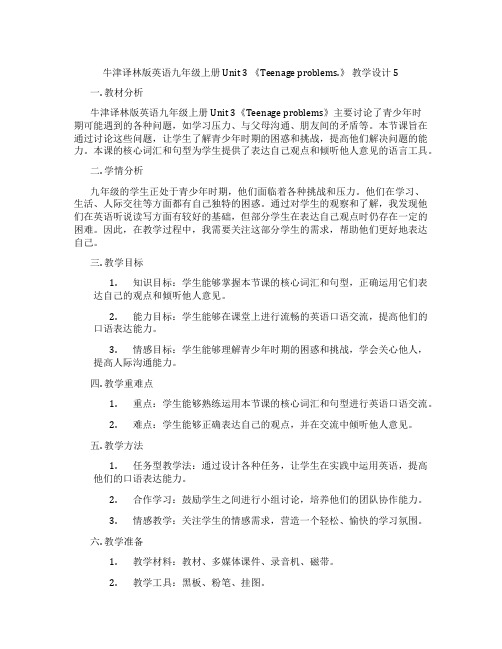
牛津译林版英语九年级上册 Unit 3 《Teenage problems.》教学设计5一. 教材分析牛津译林版英语九年级上册Unit 3《Teenage problems》主要讨论了青少年时期可能遇到的各种问题,如学习压力、与父母沟通、朋友间的矛盾等。
本节课旨在通过讨论这些问题,让学生了解青少年时期的困惑和挑战,提高他们解决问题的能力。
本课的核心词汇和句型为学生提供了表达自己观点和倾听他人意见的语言工具。
二. 学情分析九年级的学生正处于青少年时期,他们面临着各种挑战和压力。
他们在学习、生活、人际交往等方面都有自己独特的困惑。
通过对学生的观察和了解,我发现他们在英语听说读写方面有较好的基础,但部分学生在表达自己观点时仍存在一定的困难。
因此,在教学过程中,我需要关注这部分学生的需求,帮助他们更好地表达自己。
三. 教学目标1.知识目标:学生能够掌握本节课的核心词汇和句型,正确运用它们表达自己的观点和倾听他人意见。
2.能力目标:学生能够在课堂上进行流畅的英语口语交流,提高他们的口语表达能力。
3.情感目标:学生能够理解青少年时期的困惑和挑战,学会关心他人,提高人际沟通能力。
四. 教学重难点1.重点:学生能够熟练运用本节课的核心词汇和句型进行英语口语交流。
2.难点:学生能够正确表达自己的观点,并在交流中倾听他人意见。
五. 教学方法1.任务型教学法:通过设计各种任务,让学生在实践中运用英语,提高他们的口语表达能力。
2.合作学习:鼓励学生之间进行小组讨论,培养他们的团队协作能力。
3.情感教学:关注学生的情感需求,营造一个轻松、愉快的学习氛围。
六. 教学准备1.教学材料:教材、多媒体课件、录音机、磁带。
2.教学工具:黑板、粉笔、挂图。
七. 教学过程1.导入(5分钟)利用多媒体展示一些青少年时期常见的问题,如学习压力、与父母沟通等。
引导学生谈论这些问题,激发他们的兴趣。
2.呈现(10分钟)呈现本节课的核心词汇和句型,让学生通过听力练习和小组讨论来熟悉这些词汇和句型。
牛津译林版英语九上Unit 3《Teenage problems》(Grammar)教学设计
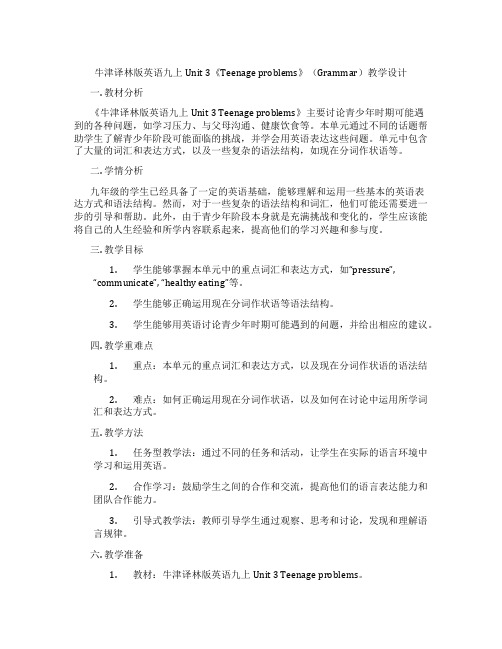
牛津译林版英语九上Unit 3《Teenage problems》(Grammar)教学设计一. 教材分析《牛津译林版英语九上Unit 3 Teenage problems》主要讨论青少年时期可能遇到的各种问题,如学习压力、与父母沟通、健康饮食等。
本单元通过不同的话题帮助学生了解青少年阶段可能面临的挑战,并学会用英语表达这些问题。
单元中包含了大量的词汇和表达方式,以及一些复杂的语法结构,如现在分词作状语等。
二. 学情分析九年级的学生已经具备了一定的英语基础,能够理解和运用一些基本的英语表达方式和语法结构。
然而,对于一些复杂的语法结构和词汇,他们可能还需要进一步的引导和帮助。
此外,由于青少年阶段本身就是充满挑战和变化的,学生应该能将自己的人生经验和所学内容联系起来,提高他们的学习兴趣和参与度。
三. 教学目标1.学生能够掌握本单元中的重点词汇和表达方式,如“pressure”,“communicate”, “healthy eating”等。
2.学生能够正确运用现在分词作状语等语法结构。
3.学生能够用英语讨论青少年时期可能遇到的问题,并给出相应的建议。
四. 教学重难点1.重点:本单元的重点词汇和表达方式,以及现在分词作状语的语法结构。
2.难点:如何正确运用现在分词作状语,以及如何在讨论中运用所学词汇和表达方式。
五. 教学方法1.任务型教学法:通过不同的任务和活动,让学生在实际的语言环境中学习和运用英语。
2.合作学习:鼓励学生之间的合作和交流,提高他们的语言表达能力和团队合作能力。
3.引导式教学法:教师引导学生通过观察、思考和讨论,发现和理解语言规律。
六. 教学准备1.教材:牛津译林版英语九上Unit 3 Teenage problems。
2.多媒体教学设备:用于展示PPT和视频材料。
3.教学素材:与本单元主题相关的图片、视频等。
七. 教学过程1.导入(5分钟)通过提问方式引导学生谈论他们所知道的青少年时期的问题,激发学生的兴趣和参与度。
牛津译林版九年级上册Unit 3《Teenage problems》(Study skills)教学

牛津译林版九年级上册Unit 3《Teenage problems》(Study skills)教学设计一. 教材分析牛津译林版九年级上册Unit 3《Teenage problems》(Study skills)围绕着青少年的学习方法展开,旨在让学生通过阅读、听力、口语和写作等环节,了解并掌握各种学习方法,以及如何有效地解决学习中遇到的问题。
本节课的主要内容包括:不同学生有不同的学习风格和策略,如何选择适合自己的学习方法,以及如何养成良好的学习习惯等。
二. 学情分析九年级的学生已经具备了一定的英语基础,能够进行简单的听、说、读、写操作。
但部分学生在面对较复杂的文章时,可能会存在阅读困难,理解能力有限。
此外,学生对学习方法和策略的认识相对较弱,需要老师在教学中进行引导和启发。
三. 教学目标1.知识目标:让学生掌握与学习方法相关的词汇和表达,如effective,strategy, improve等。
2.能力目标:培养学生通过阅读、听力、口语和写作等多种方式,理解和运用本节课所学内容。
3.情感目标:引导学生认识到学习方法的重要性,激发学生探索适合自己的学习方法,养成良好的学习习惯。
四. 教学重难点1.重点:让学生理解和运用本节课所学词汇和表达。
2.难点:引导学生如何选择适合自己的学习方法,以及如何养成良好的学习习惯。
五. 教学方法1.任务型教学法:通过设定各种任务,让学生在实践中学习和运用英语。
2.合作学习法:鼓励学生分组讨论,培养学生的团队协作能力。
3.情感教学法:关注学生的情感需求,激发学生的学习兴趣。
六. 教学准备1.教材:牛津译林版九年级上册Unit 3《Teenage problems》(Studyskills)2.多媒体设备:电脑、投影仪、音响等3.教学素材:相关学习方法的文章、视频等4.课件:制作与本节课相关的内容,包括词汇、图片、视频等七. 教学过程1.导入(5分钟)利用课件展示一些关于学习方法的名言,如“活到老,学到老”、“适合自己的才是最好的”等,引导学生思考如何选择适合自己的学习方法。
牛津译林版-英语-九上-9A 3单元 Teenage problems

9A Unit 3 Teenage problems(2)第三单元青少年问题重点难点21.I hope I cam offer you some useful suggestions.我希望我能够提供一些有用的建议给你。
▲offer 用作动词,意为“提供;”“为…提供机会,给予”常用短语“offer sb. sth 或offer sth. For sb.”意思是“为某人提供某物”。
如:①I offered him a glass of wine.我敬了他一杯酒。
①will you offer the guests some coffee?请你给客人拿一些咖啡好吗?②I﹐ve been offered a job in Japan.日本有份工作要聘请我去做。
③The company has offered a high salary.公司提出高薪招聘。
④She offered a reward for the return of her lost bracelet.她为寻回遗失的手镯提出以报酬答谢。
⑤He offered §3,000 for the house.他提出了3000英镑买这间房子。
⑥We offered him the house for $ 20,000.我们要他出20,0000美元买这间房子。
offer to do sth.的意思是“主动提出做某事。
”如:She offered to carry the box for her mother. 她主动提出要帮她母亲拿箱子。
We offered to leave. 我们表示要走了。
He offered to lend me his bike.他表示要把自行车借给我。
Never to teach fish to swim.莫班门弄斧。
He offered to hit me. 他企图打我。
She offered to help me to learn English.她提出要帮助我学习英语。
Unit 3 Teenage problems知识总结 牛津译林版英语九年级上册
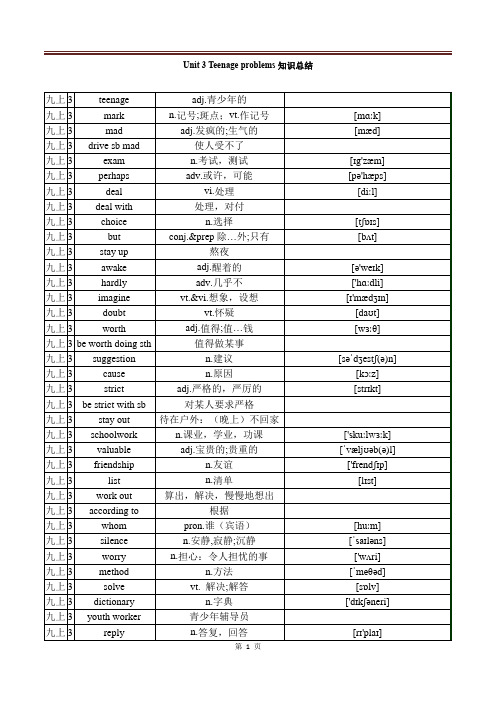
Unit 3 Teenage problems知识总结中文英文值得做某事be worth doing sth别无选择只能做have no choice but to do sth把某人逼疯drive sb. mad处理deal with熬夜stay up呆在户外/晚上不回家stay out对某人要求严格be strict with sb算出/解决work out嘲笑laugh at根据according to复习/回顾/仔细检查go over不客气don’t mention it许多与我们同龄的学生many students of our age取得更大的进步make greater progress少吃多运动eat less and exercise more感到孤独feel lonely高/低/满分low/high/full/top marks更合理安排你的时间manage your time better无法想象没有爱好的生活can’t imagine my life without hobbies毫无疑问no doubt /without doubt给我提供一些有价值的建议offer me some valuable suggestions/advice对足球痴迷be crazy about football我问题的根源the cause of my problem陷入麻烦get into trouble对我要严格be strict with me培养/发展我们的爱好develop our hobbies在我的学业和我的爱好间取得平衡achieve a balance between my schoolwork and my hobbies表达自己有困难have difficulty expressing myself解决问题的一个好方法 a good method of (for) solving the problem喜欢英语、数学和化学love English, Maths and Chemistry优等生top students写一封回信write a reply不要理会那些嘲笑你的同学pay no attention to those classmates who laugh at you 觉得运动困难find sport difficult以……而骄傲/自豪be proud of/take pride in读出声read aloud把所有单词读正确pronounce all the words correctly通过考试/考试不及格pass/fail an exam预测结果predict a result。
译林牛津版九年级英语上Unit 3 Teenage problems Comic strip and

译林牛津版九年级英语上Unit 3 Teenage problems Comic strip and Welcome to theunit 教案牛津版﹒义务教育课程标准实验教科书九年级英语(上册)Unit 3---Teenage problems Comic strip and Welcome to the unit 教案一. 教材分析: 本单元的主题为青少年烦恼,Comic Strip部分通过两只小狗的对话,激发了学生对本单元的兴趣,唤起他们倾诉烦恼的欲望。
Welcome to the unit 中为我们展示了青少年中的各种烦恼,许多学生因为学习、交友、家庭关系等问题产生很大的压力,随着青少年生理上的变化,很多学生正面临一段非常困难的时期,教师引导学生倾诉自己的烦恼并思考如何解决这些烦恼,学会向别人求助,从而获得健康的心态。
教材编写注意前后知识的衔接,教师在教学过程中要注意对学生进行疏导,帮助学生通过正确、合理的方式解决自己的问题。
教师要通过创设不同的情境,利用现代化的教学手段,使学生获得直观印象的同时,对学生的听、说、读、写能力的进行综合训练,帮助学生得到能力的训练和情感的升华.二. 学情分析: 学生已经在牛津9A Unit1Know yourself 学习过关于性格、星座等相关知识,同时Unit2也帮助学生了解了颜色和心情间的关系,这样对Unit3中解决自身的烦恼就有了科学的方法,学生易于接受。
而且学生有良好的协作学习习惯和自主学习能力,对倾诉自身烦恼的话题很感兴趣.【教学目标】知识目标:词汇:teenage mad mark exam perhaps词组:get fat get enough sleep drive me madclose friends get low marks in examsmanage your time better句型:Why not eat less and exercise moreThey don’t have time for me.能力目标:1.能用英语谈论自己在学习、交友、家庭关系等方面所遇到的烦恼。
牛津译林版英语九年级上册Unit3《Teenageproblems.》说课稿2

牛津译林版英语九年级上册 Unit 3 《Teenage problems.》说课稿2一. 教材分析《牛津译林版英语九年级上册 Unit 3 Teenage problems》是人教版初中英语教材的一个单元,主题是关于青少年问题的讨论。
本单元主要围绕青少年的日常生活中的问题展开,包括学习压力、与父母沟通、网络安全等方面。
通过本单元的学习,学生能够提高自己在现实生活中解决问题的能力,同时增强自己的英语听说读写技能。
二. 学情分析九年级的学生已经具备了一定的英语基础,能够理解和运用一些基本的英语句型和语法知识。
然而,他们在词汇量和语言表达能力方面还有待提高。
此外,由于本单元涉及到一些敏感话题,如网络安全等,学生可能对此有一定的抵触情绪,需要教师进行适当的引导。
三. 说教学目标1.知识目标:学生能够掌握本单元的核心词汇和句型,理解文章的主旨大意。
2.能力目标:学生能够运用所学的词汇和句型,进行日常交流和讨论,提高自己的口语表达能力。
3.情感目标:学生能够认识到青少年问题的严重性,提高自我保护意识,培养积极健康的生活态度。
四. 说教学重难点1.重点:学生能够掌握本单元的核心词汇和句型,理解文章的主旨大意。
2.难点:学生能够运用所学的词汇和句型,就青少年问题展开讨论,提高自己的口语表达能力。
五. 说教学方法与手段1.教学方法:采用任务型教学法,让学生在完成具体任务的过程中,提高自己的英语听说读写技能。
2.教学手段:利用多媒体课件、网络资源等,为学生提供丰富的学习资源,激发学生的学习兴趣。
六. 说教学过程1.导入:教师通过提问方式,引导学生谈论青少年问题,激发学生的学习兴趣。
2.阅读理解:学生通过阅读文章,回答相关问题,理解文章的主旨大意。
3.小组讨论:学生分成小组,就文章中的问题进行讨论,提高自己的口语表达能力。
4.写作练习:学生根据所学内容,写一篇关于青少年问题的短文。
5.课堂展示:学生展示自己的写作成果,其他学生进行评价。
牛津译林版九年级英语上册 Unit 3 Teenage problems 知识点整理与默写
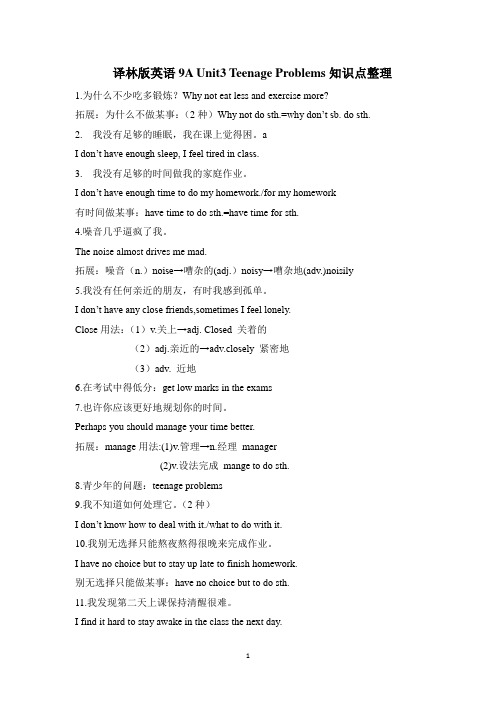
译林版英语9A Unit3 Teenage Problems知识点整理1.为什么不少吃多锻炼?Why not eat less and exercise more?拓展:为什么不做某事:(2种)Why not do sth.=why don’t sb. do sth.2.我没有足够的睡眠,我在课上觉得困。
aI don’t have enough sleep, I feel tired in class.3.我没有足够的时间做我的家庭作业。
I don’t have enough time to do m y homework./for my homework有时间做某事:have time to do sth.=have time for sth.4.噪音几乎逼疯了我。
The noise almost drives me mad.拓展:噪音(n.)noise→嘈杂的(adj.)noisy→嘈杂地(adv.)noisily5.我没有任何亲近的朋友,有时我感到孤单。
I don’t have any close friends,sometimes I feel lonely.Close用法:(1)v.关上→adj. Closed 关着的(2)adj.亲近的→adv.closely 紧密地(3)adv. 近地6.在考试中得低分:get low marks in the exams7.也许你应该更好地规划你的时间。
Perhaps you should manage your time better.拓展:manage用法:(1)v.管理→n.经理manager(2)v.设法完成mange to do sth.8.青少年的问题:teenage problems9.我不知道如何处理它。
(2种)I don’t know how to deal with it./what to do with it.10.我别无选择只能熬夜熬得很晚来完成作业。
牛津译林版-英语-九上-牛津译林版九上英语 3单元 Teenage problems 知识点小结
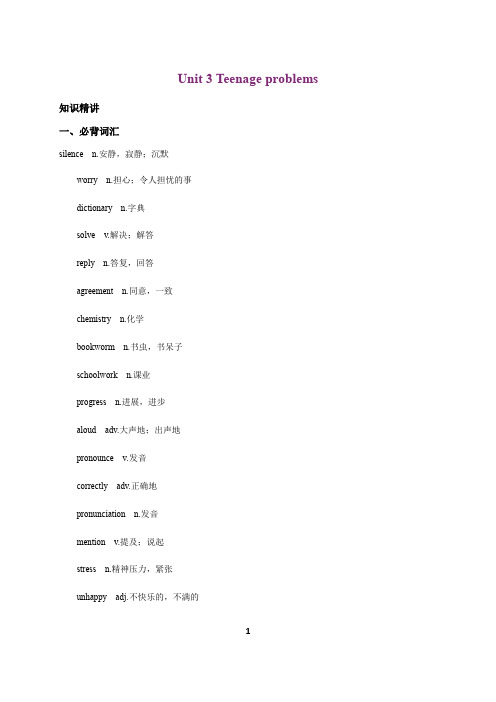
Unit 3 Teenage problems 知识精讲一、必背词汇silence n.安静,寂静;沉默worry n.担心;令人担忧的事dictionary n.字典solve v.解决;解答reply n.答复,回答agreement n.同意,一致chemistry n.化学bookworm n.书虫,书呆子schoolwork n.课业progress n.进展,进步aloud adv.大声地;出声地pronounce v.发音correctly adv.正确地pronunciation n.发音mention v.提及;说起stress n.精神压力,紧张unhappy adj.不快乐的,不满的1二、重点词汇1. silence n.1). a period without any sound; complete quiet宁静;寂静例句:A loud crash of thunder broke the silence of the night.一声炸雷打破了夜晚的宁静。
2). a state of not speaking or writing or making a noise无声;沉默;缄默例句:Their mother's angry words reduced the children to silence.母亲生气的训斥让孩子们都默不作声了。
2. solve v.to find an answer to a problem思索,思考例句:to solve a problem 解决问题to solve a mystery/puzzle 揭开秘密/谜底3. aloud adv.in a voice loud enough to be heard4大声地;出声地例句:He read her letter aloud to the rest of the family.他把她的信大声读给家人听。
牛津译林版九上《Unit 3 Teenage problems》

a. people keep their worries to themselves
b. people relax and take a holiday
c. friends try to help
causes of stress
Part Two Structure How to write a letter? ( Part B on page 58) How many parts are there in the writing plan?
conclusion
Your friend
Millie
小 结
通过这堂课的学习,学会了如何谈论 你在学习和生活中遇到的问题和困难,以 及你自己是如何解决他们的。 请同学们要 记住文章的写作结构,还要记住在文章的 主体部分一定要包含两种信息:产生压力 的原因以及你采取的措施。
Homework
1. Write a letter to your pen friend to tell him/her about the problems you have and how you deal with them. Use the beginning of Millie’s letter in Part C as a model. 2. Do some additional exercises.
Additional exercisபைடு நூலகம்s
一、用所给词的适当形式填空。
1. What will you ______(do) if someone _____ (laugh) at you? 2. Some students don’t have enough time _____ (finish) their homework. 3. They are quarrelling _____(noise) than usual. 4. Some students should give up _____ (play) computer games. 5. You are so nervous now. You should get_____ (relax).
译林牛津版九年级上册英语Unit 3 单元词句梳理

Unit 3 Teenage problemsPeriod 1 Comic strip & Welcome to the unit必背单词1. mark n. 分数2. mad adj. 发疯的; 生气的3. eination) 考试,测试4. perhaps adv. 或许,可能必背短语5. get fat 变胖6. get enough sleep 得到充足的睡眠7. drive me mad 把我弄疯了8. close friends 亲密的朋友9. get low marks in eanage your time better 合理地安排你的时间必背句子11. Why not eat less and eore? 为什么不少吃多运动呢?12. They don’t have time for me. 他们没有时间陪我。
Period 2 Reading必背单词1. deal vi. 处理2. choice n. 选择→ choose v. 选择3. but conj. & prep. 除……外;只有→ but conj. 但是;然而4. awake adj. 醒着的→ wake v. 唤醒;醒来5. hardly adv. 几乎不→ hard adj. 坚硬的;艰难的adv. 努力地;艰难地6. imagine vt.& vi. 想象, 设想7. doubt vt. 怀疑8. worth adj. 值得; 值……钱9. suggestion n. 建议→ sugge st v. 建议;提议10. cause n. 原因11. strict adj. 严格的, 严厉的12. schoolwork n. 课业13. valuable adj. 宝贵的;贵重的→value n. 价值14. friendship n. 友谊15. list n. 清单必背短语16. deal with 处理,对付17. stay up late 熬夜到很晚18. stay awake 保持清醒19. have spare time for my hobbies 有空闲时间花在我的业余爱好上20. be worth doing sth. 值得做某事21. dream of a long holiday 梦想有个长假期22. offer me some suggestions 给我提供一些建议23. become the cause of my problem 成为我的问题的原因24. worry about the time 担心时间25. get into trouble 陷入困境26. play outside 在外面玩27. be strict with sb. 对某人要求严格28. develop our hobbies 培养我们的业余爱好29. stay out 待在户外;( 晚上) 不回家30. valuable advice 宝贵的建议31. make a list of 列一份清单32. work out 算出; 解决33. according to 根据必背句子34. I do not know how I should deal with it.我不知道应该如何解决它。
牛津译林版九年级上册Unit3《Teenageproblems》说课稿5
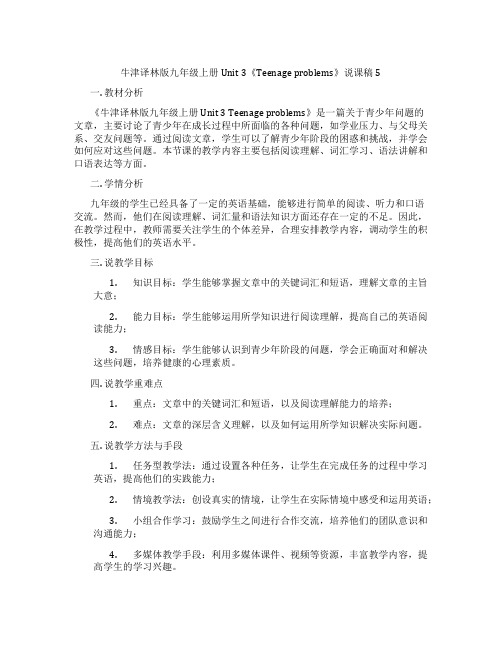
牛津译林版九年级上册Unit 3《Teenage problems》说课稿5一. 教材分析《牛津译林版九年级上册Unit 3 Teenage problems》是一篇关于青少年问题的文章,主要讨论了青少年在成长过程中所面临的各种问题,如学业压力、与父母关系、交友问题等。
通过阅读文章,学生可以了解青少年阶段的困惑和挑战,并学会如何应对这些问题。
本节课的教学内容主要包括阅读理解、词汇学习、语法讲解和口语表达等方面。
二. 学情分析九年级的学生已经具备了一定的英语基础,能够进行简单的阅读、听力和口语交流。
然而,他们在阅读理解、词汇量和语法知识方面还存在一定的不足。
因此,在教学过程中,教师需要关注学生的个体差异,合理安排教学内容,调动学生的积极性,提高他们的英语水平。
三. 说教学目标1.知识目标:学生能够掌握文章中的关键词汇和短语,理解文章的主旨大意;2.能力目标:学生能够运用所学知识进行阅读理解,提高自己的英语阅读能力;3.情感目标:学生能够认识到青少年阶段的问题,学会正确面对和解决这些问题,培养健康的心理素质。
四. 说教学重难点1.重点:文章中的关键词汇和短语,以及阅读理解能力的培养;2.难点:文章的深层含义理解,以及如何运用所学知识解决实际问题。
五. 说教学方法与手段1.任务型教学法:通过设置各种任务,让学生在完成任务的过程中学习英语,提高他们的实践能力;2.情境教学法:创设真实的情境,让学生在实际情境中感受和运用英语;3.小组合作学习:鼓励学生之间进行合作交流,培养他们的团队意识和沟通能力;4.多媒体教学手段:利用多媒体课件、视频等资源,丰富教学内容,提高学生的学习兴趣。
六. 说教学过程1.导入:通过提问方式引导学生思考青少年阶段的问题,激发学生的学习兴趣;2.阅读理解:学生自主阅读文章,完成相关练习,教师进行讲解和指导;3.词汇学习:学生学习文章中的关键词汇和短语,教师进行讲解和举例;4.语法讲解:教师讲解文章中的语法知识,学生进行练习;5.口语表达:学生根据文章内容进行口语表达,教师进行评价和指导;6.总结与反思:学生总结所学内容,教师进行点评和鼓励。
译林牛津英语九年级上册Unit 3 Teenage problems组合训练及答案
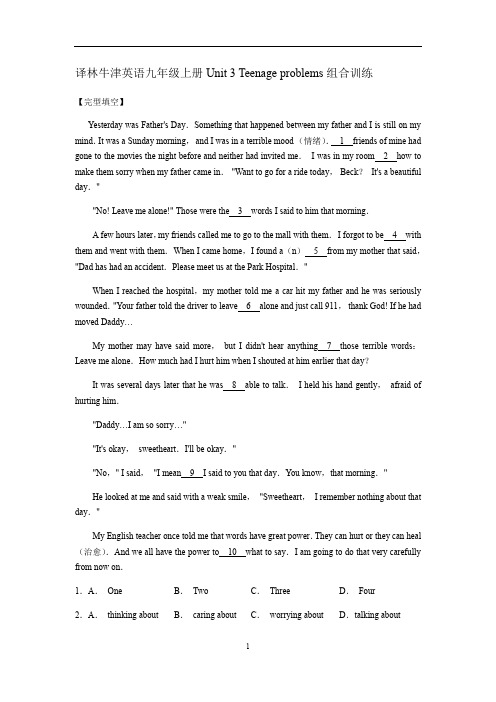
译林牛津英语九年级上册Unit 3 Teenage problems组合训练【完型填空】Yesterday was Father's Day.Something that happened between my father and I is still on my mind.It was a Sunday morning,and I was in a terrible mood (情绪).1friends of mine had gone to the movies the night before and neither had invited me.I was in my room2how to make them sorry when my father came in."Want to go for a ride today,Beck?It's a beautiful day.""No! Leave me alone!" Those were the3words I said to him that morning.A few hours later,my friends called me to go to the mall with them.I forgot to be4with them and went with them.When I came home,I found a(n)5from my mother that said,"Dad has had an accident.Please meet us at the Park Hospital."When I reached the hospital,my mother told me a car hit my father and he was seriously wounded."Your father told the driver to leave6alone and just call 911,thank God! If he had moved Daddy…My mother may have said more,but I didn't hear anything7those terrible words:Leave me alone.How much had I hurt him when I shouted at him earlier that day?It was several days later that he was8able to talk.I held his hand gently,afraid of hurting him."Daddy…I am so sorry…""It's okay,sweetheart.I'll be okay.""No," I said,"I mean9I said to you that day.You know,that morning."He looked at me and said with a weak smile,"Sweetheart,I remember nothing about that day."My English teacher once told me that words have great power.They can hurt or they can heal (治愈).And we all have the power to10what to say.I am going to do that very carefully from now on.1.A.One B.Two C.Three D.Four2.A.thinking about B.caring about C.worrying about D.talking about3.A.common B.last C.interesting D.polite 4.A.strict B.happy C.pleased D.angry 5.A.letter B.diary C.note D.email 6.A.me B.them C.her D.him 7.A.except B.besides C.towards D.beside 8.A.possibly B.finally C.suddenly D.sadly 9.A.how B.why C.what D.that 10.A.keep B.write C.understand D.choose【阅读理解】AWhen I was a child, I was a tomboy(假小子). I had a cowboy hat and cowboy boots. My brothers were two and four years older than I. We often played games together.Once, my brothers and I fell in love with playing a game called “stealing horses”. Then my parents decided to buy my brothers guns. These were not “real” guns. Because I was a girl, I didn’t get a gun. They shot and shot at everything with their new guns. I tried to “fight” them with my bow and arrows (弓和箭). But I was still in the poor position without a gun.One day while I was hiding behind a wall, looking out toward the fields, I felt a terrible blow to my right eye. I looked up just in time to see my brother lower his gun. Both brothers rushed to my side. My eye felt great pain and I covered it with my hand. “If you tell that to Mummy,” they said, “We will get a whipping(鞭打) from Daddy. You don’t want that to happen, do you?” I did not. “Here is a piece of wire(电线),” said the older brother, picking it up from the floor, “Say you stepped on one end of it and the other flew up and hit you.” “Yes,” I said. To be honest, I didn’t want them to be punished. So I did as my brothers told me to do.A week after the “accident” my parents took me to see a doctor. Finally I knew my brothers were worried about my eye, so they told our parents what had happened and asked them to take me to see a doctor.1.According to the passage, the two brothers were .A. strictB. cleverC. politeD. naughty(淘气的)2.What does the underlined(划线的)phrase “in the poor position” mean in Chinese?A. 处于劣势B. 在低洼处C. 处于虚弱状态D. 处于贫穷状态3.The two brothers asked the writer to tell a lie because they were afraid .A. they would lose their gunsB. their parents would punish themC. they couldn’t play the game any moreD. their parents would take their sister to see a doctor4.Choose the correct order according to the passage.①The writer was hurt.②The brothers told the truth.③The parents bought guns for the brothers.④The parents took the writer to see a doctor.A. ②③①④B.③①②④C. ③①④②D. ③②①④5.What can we infer(推断) from the passage?A. The writer’s parents didn’t like herB. The writer and her two brothers loved each otherC. The writer’s brothers wanted to hurt herD. The two brothers didn’t get on well with each otherB“Growing up, Einstein saw his father struggle to support the family and move the family for different jobs, Einstein had to move between schools and it was challenging for him to catch up with his new class.”This story about the struggles(f +)of famous scientists can't be found in your science textbook, but a new study suggested maybe it should be.In the study, 402 9th-and 10th-grade students from four New York City high schools in low-income areas were divided into three groups. The students read some 800-word stories about Albert Einstein and Marie Curie. The control group read a regular science textbook description about their great achievements. Another group read about the scientists' personal struggles, like Einstein's running away from Nazi Germany. The third group read about the scientists' intellectual struggles, as they tried different experiments--- and failed.As it turned out. the students who had read about scientists' struggles, whether personal or intellectual, had higher grades than students who had read about achievements. Those who weren’t getting good grades to begin with gained the most. Those in the control group not only didn't see a grade increase, they had lower grades than the grading before the study began.“We think that struggle stories showed scientists' weaknesses.” the researchers write, “whichcreates a sense of connection between the students and scientists. And that may make it easier for students to see them as role models.”“When kids think Einstein is a talent who is untouchable, then they believe they will never get there, "said lead researcher Xiaodong Lin-Siegler, PhD.If we want to educate a future generation of great scientists, we can start by changing the way we talk about the great scientists of the past. An 800-word story about scientists’ failures, not just their achievements, in science textbooks will make it happen.6. What does the article mainly talk about?A. Learning about struggles of scientists may help students succeed in science.B. Reading stories of scientists' achievements will help educate future scientists.C. Science textbooks should describe scientists failures instead of their achievements.D. Stories of scientists' struggles may make students see scientists as being untouchable.7. From Paragraph 4, we can know that .A. those good at science achieved most from this exerciseB. the control group had lower grades than the other two groupsC. the students' grades in the control group remained the sameD. the students in the third group had the highest grades8. What's the main idea for Paragraphs 5 and 6?A. Findings of the studyB. Explanations from the researchersC. Process of the studD. Suggestions from the researchers9. In the study, which of the following would the third group probably read?A. Einstein won many awards in his life, including the 1921 Nobel Prize in physics.B. Going to college was hard for Curie because at that time women were not allowed to attend school. So, Curie had to study at secret classes.C. By the time she reached college, Curie was able to understand five languages that top scientists spoke at that time.D. Often working hour after hour and day after day. Curie devoted herself to solving challenging problems and learning from her mistakes.【阅读表达】Life offers so many lessons,both practical and personal,that you're never too young to beginlearning them. Here are some skills to learn as soon as possible.Money ManagementWhenyou start receivingmoney of your own,it’s time to start understanding yourrelationship with money. In a world where you can buy any and every object,the key is to save money by buying only essentials(必需品)and a treat sometimes.CookingOne great way to save money is to learn to cook for yourself. Beyond that,cooking at home also helps you control your diet for better health. If you start doing this at an early age ,you will not have to depend on your parents too much.Keeping PromisesPromises are a matter of honesty and should be made with care. We must learn from an early age that our word must be followed up by action. When it isn't,others will quickly lose trust in us and not respect us .Accepting Rejection(拒绝)Though you must be careful not to break your word,others' promises aren't always kept. Learn about it early,and you won't be hurt easily. Also, not every job application or desired(渴望的)friendship will work out, so remember that there are more fish in the sea.Lifelong LearningNo matter how old you get,there will always be things beyond your understanding. It's better to learn to be modest now rather than take a proud fall later in life. Be open to new experiences and keep learning. And it’s never too late to start.1.How many skills are talked about in the passage?2.Which two skills can help you save money?3. If one of your friends breaks his promise to you,will you be angry? Why or why not?【书面表达】树立自我保护意识,健康快乐地成长是每个青少年的必修课.下面是某地关心下一代工作委员会为青少年编写的《青少年自我保护、健康成长手册》的部分内容.作为一名中学生,写一篇文章,内容包括:①陈述你是怎样践行手册中提及的三条事项的;②补充至少一条你认为重要的其他事项.要求:1.语言通顺,要点齐全,意思连贯,条理清楚,书写规范;2.文中不得出现真实的姓名和学校名称;3.80~100词,文章开头和结尾已给出,不计入总词数.Self﹣protection is one of the most important skills for teenagers.But how do I protect myself and grow up healthily?Now let me share my experiences and ideas with you.First,I always obey the traffic rules_____________________________________ ______________________________________________________________________________ ______________________________________________________________________________ ______________________________________________________________________________ ______________________________________________________________________________ In short,if we obey the rules and take care of ourselves,we will grow up safely and healthily.【参考答案】【完型填空】1.B 考查数词辨析.A一;B二;C三;D四;根据后面neither had invited me.两人都没有邀请我,可知是我的两个朋友,故答案是B.2.A 考查短语辨析.A考虑;B关心;C担心;D讨论;根据后面how to make them sorry 怎么让他们难过,前面应该是正在想,故答案是A.3.B 考查形容词辨析.A普通的;B最后的;C有趣的;D礼貌的;根据前面No! Leave me alone!"不!别管我!及后面爸爸车祸了,可知这里words I said to him that morning是那天早上说的最后的话,故答案是B.4.D 考查形容词辨析.A严格的;B开心的;C高兴的;D生气的;根据后面went with them 和他们一起去了,可知是忘记生气了,故答案是D.5.C 考查名词辨析.A信;B日记;C便条;D邮件;根据后面Dad has had an accident.Please meet us at the Park Hospital."爸爸出了事故,请到公园医院来见我们,应该是便条,故答案是C.6.D 考查代词辨析.A我;B他们;C她;D他;根据Your father told the driver to leave(6)alone and just call 911你的爸爸告诉司机,别管他(指作者的爸爸),故答案是D.7.A 考查介词辨析.A除了;B除…之外;C朝着;D在…旁边;根据but I didn't hear anything 7 those terrible words:Leave me alone.除了别管我,我什么也没听到,except 表示"从所提到的人或事物中除去,即从整体中除去一部分",表示递减的概念,含义是否定的.besides 表示"除了……之外,还有……",指"在整体中加入一部分",表示递加的概念,含义是肯定的,故答案是A.8.B 考查副词辨析.A可能地;B最后,总算;C突然;D伤心;根据后面able to talk能说话,应该是数周后总算能说话,故答案是B.9.C 考查连词辨析.A怎样;B为什么;C什么;D那,那个;根据题干,作宾语,应该是那天早上我和你说的,故答案是C.10.D 考查动词辨析.A保持;B写;C理解;D选择;根据前面My English teacher once told me that words have great power.They can hurt or they can heal 我的英语老师曾经告诉我,语言有很大的力量,它们可以伤害人,也可以治愈人,后面应该是选择说什么,故答案是D.【阅读理解】DABBB ABBD【阅读表达】1.Five.2.Money Management and Cooking.3.Yes.Because I think promises are a matter of honesty.No.Because I've learned others' promises aren't always kept.【书面表达】Self﹣protection is one of the most important skills for teenagers.But how do I protect myself and grow up healthily?Now let me share my experiences and ideas with you.First,I always obey the traffic rules and I never run the red light,When the traffic light is red.I won' t go unit it turns green.I always walk across the zebra crossing because it' s safe.Second,I often eat healthily and safely.It's important to eat more fruit and vegetables.Eating too much fast food will do harm to my body.Third,I never meet strangers alone,especially friends who I make on the Internet.At the same time,we should help each other if we are true friends.What's more,I'd like to give you some advice.Now summer is coming and it's dangerous for us to swim alone,especially in deep water.So don't do that.In short,if we obey the rules and take care of ourselves,we will grow up safely and healthily.2018-2019学年上学期九年级英语组合训练【完型填空】Robert and Henry were going home from school,when,on turning a corner,Robert1out,"A fight! Let us go and see!" "No," said Henry;"Let us go quietly home and avoid this quarrel.We have2to do with it,and may get into trouble.""You are not a brave boy,and afraid to go,"said Robert,and off he ran.Henry went straight home,and in the afternoon went to school,as usual,3Robert had told all the boys that Henry was a coward,and they laughed at him a great deal.A few days4,Robert was bathing with some schoolmates and5his depth.He struggled and screamed for help,but all in vain.The boy6had called.Henry a coward,got away from the water as fast as they could,but they did not even try to help him.Robert was fast7,when Henry threw off his clothes,and sprang into the water,By great effort,and8much danger to himself,he brought Robert to the shore,and thus saved his life.Robert and his schoolmates were9at having called Henry a coward.They admitted that he had more10than any of them.Never be afraid to do good,but always fear to do evil.1.A.cried B.jumped C.said D.turned2.A something B.anything C.nothing D.everything3.A.Or B.But C.And D.So4.A.afterward B.before C.ago D.later5.A.got out of B.got into C.got on D.got off6.A.whom B.who C.which D.whose7.A.swimming B.playing C.crossing D.sinking8.A.with B.in C.on D.at9.A.mad B.good C.sad D.ashamed 10.A.courage B.strength C.power D.ability【阅读理解】AThink of the animal world. and a group of colorful wild animals will spring to mind: a parrot's rainbow feathers or the showy scales of sea fish. But, many mammals(哺乳动物) on the planet come in only two colors: black and white. Spend some time exploring what science has discovered about these animals' appearances, and you' ll see that basic black and white isn't so basic at all.1. According to the passage, which of the following sentences is TRUE?A. The panda's white parts help it hide against snow.B. Both white spots and white stripes help skunks kill their victims.C. Zebras with wider stripes are less attractive to flies.D. Scientists have already known all the secrets about the stripes.2. What does the underlined word "vulnerable" mean?A. Being easily landed.B. Being easily attracted.C. Being easily discovered.D. Being easily attacked.3. Which could be the best title of the passage?A. Why Animal Stripes Come in Different ShapesB. Why So Many Animals Wear Black-and-White CoatsC. How Wild Animals Protect Themselves from EnemiesD. How Black and White Become Basic Colors in Animal WorldBWhen your dream is to become a footballer and play for Barcelona, nothing should get in your way — even if you have no feet.An 11-year-old schoolboy Gabriel Muniz, who was born without feet, will fly from his home inBrazil to take part in the Spanish club’s summer training camp. Although he is disabled, Muniz is one of the top players at the school and captain of his gym class. He can run, dribble (运球), pass and strike the ball as well as any of his able-bodied teammates. He spends all his spare time on the football pitch.His best friend Lucas Santos spoke about his abilities on a video for The Sun, “He is skillful, he goes after it, he is fearless and he knows how to organize plays. He also makes good passes.”Mum Sandra was thrilled that her son would achieve his dreams. She said, “He started walking before he was one. We would go after him, expecting him to keep falling, but he never fell.”Muniz’s gymteacher added, “He is challenging the social norms (标准). When he arrived there, no one believed in him.” But he showed to everyone that he could play as well as any other boy. So he was invited to go to Spain to show his talent.The Spanish La Liga soccer club has offered to fly Muniz to Spain in September, where he’ll be able to show off his “fancy footwork” and meet his idol, Barça soccer player Lionel Messi.Muniz wears a prosthetic (假体的) ankle and foot to help him get around in rainy weather. Heknows that his disability means he’ll never be able to play for a professional football team and so Muniz is hoping that football will one day become a Paralympic (残奥会的) sport.4.Who praised Muniz’s football abilities?A.His idol, Messi.B. His best friend.C. His mum, Sandra.D. His gym teacher.5.The underlined word “thrilled” in paragraph 3 has the similar meaning to________.A.excitedB. worriedC. disappointedD. interested6.The time order of the following sentences is Muniz_________.① played football well and became captain of his school gym class② could walk without falling when he was very little③ was asked to fly to Spain for a summer training campA. ①②③B. ③②①C. ②①③D. ②③①7.We can tell that Muniz according to the passage.A.has difficulty in living a normal lifeB.dreams to play for a professional football teamC.will play football for the Spanish La Liga soccer clubD.hopes that playing football will be part of Paralympic Games.8.Which saying can express the spirit of the passage?A.Failure is the mother of success.B.Never put off tomorrow what we can do today.C.Where there is a will, there is a way.D.A good beginning is half done.【阅读表达】Paul and Caroline King chose to travel around the world instead of putting their children intoa school because they felt they couldn't find one that was good enough. They have spent the last19 months taking their children, six-year-old Winston and four-year-old Henry, around 15 countries. The couple say that their sons are more advanced(超前的)than other children. After looking at around 20 schools for their children, they made the life-changing decision. After selling their house, they have now taught the boys themselves and have no plans to stop now.Mr. King said, "We'll never force the boys to go to school or take an exam. We don't raise our voices to the boys." Mrs. King considered the idea when Winston said he was bored at school when he began learning to read at the age of four.After starting their travels in Romania(罗马尼亚), then Dubai, the family have gone on to visit India, Malaysia, Thailand, the US, Spain, Italy and other countries. They have plans to go to Iceland and Australia next.1 .Where did the family start their journey?2. How are the couple teaching their children?3. Do you support Paul and Caroline King's decision, why or why not?【书面表达】现在,越来越多的外国友人开始关注中国文化.假定你是苏华,你的加拿大笔友Ryan是一个中国迷,他想在中秋期间来中国看看.请认真阅读他写给你的邮件,根据邮件内容及你的了解用英语回复.To:suhua@ china.comFrom:ryan2003@canada.comSubject:Chinese cultureDear Su Hua,How are you?I hope you are well.As a fan of Chinese culture,I'm thinking aboutgoing to China during the Mid﹣autumn Festival.Would you please tell me the followingthings?• How do you usually celebrate the Mid﹣autumn Festival?• Which city in China is most worth visiting?Why?• What is the best way to travel between cities in China?• What gift can I buy for my friends?Please write back and tell me everything.Best wishes,Ryan注意:1.词数90左右,开头和结尾已经写好,不计入总词数;2.回复须包括所有要点,可适当发挥,使短文连贯、通顺;3.文中不得提及真实的人名、校名等相关信息.Dear Ryan,I'm glad to hear you're coming to China.China is a country with a long history and rich culture.________________________________________________________________I hope my reply is of some help to you.Looking forward to seeing you in China.All the best,Su Hua【参考答案】【完型填空】1.A 考查动词.A.cried哭泣,喊叫;B.jumped跳;C.said 说;D.turned 转.根据后句A fight! Let us go and see!" "No," said Henry;"Let us go quietly home and avoid this quarrel.打架!让我们去看看吧!""不,"亨利说,"让我们安静地回家,避免这场争吵.可知结合选项,应说当他转过一个拐角,罗伯特大声喊道.故选A.2.C 考查不定代词.A something某事;B.anything任何事;C.nothing无事;D.everything 每件事.根据前句A fight! Let us go and see!" "No," said Henry;"Let us goquietly home and avoid this quarrel.打架!让我们去看看吧!""不,"亨利说,"让我们安静地回家,避免这场争吵.可知结合选项,应说我们和它毫无关系.故选C.3.B 考查连词.A.Or或者;B.But 但是;C.And 和;D.So 因此.根据前句in the afternoon went to school,as usual,在下午的时候,像往常一样去上学.和Robert had told all the boys that Henry was a coward,罗伯特告诉所有的男孩,亨利是个懦夫,可知前后句是转折的关系,but但是,表示转折,结合选项,应说在下午的时候,像往常一样去上学,但是罗伯特告诉所有的男孩,亨利是个胆小鬼,故选B.4.D 考查形容词.A.afterward 以后,后来;B.before 在…之前;C.ago 以前;D.later 后来,稍后.根据后句Robert was bathing with some schoolmates 罗伯特和一些同学一起洗澡.可知结合选项,应说几天后,故选D.5.A 考查短语.A.got out of,从…出来,浸入;B.got into走进;C.got on 进步;D.got off 下车.根据后句his depth.He struggled and screamed for help,but all in vain.可知结合选项,应说罗伯特正和同学们在一个水池中洗澡,不自觉地浸入到深水区.他挣扎着,尖叫着寻求帮助,但都是徒劳的.故选A.6.B 考查疑问词.A.whom 谁,who的宾格;B.who谁;C.which 哪个;D.whose 谁的.根据前后句The boy…had called.可知结合选项,应说那些叫亨利胆小鬼的孩子们,who引导定语从句.故选B.7.D 考查动词.A.swimming游泳;B.playing玩;C.crossing 穿过;D.sinking 下沉.根据前句but they did not even try to help him.甚至没有一个人想到去帮助他.可知结合选项,应说罗伯特正在迅速下沉,故选D.8.A 考查介词.A.with和,与,在;B.in 在…里;C.on在…上;D.at 在.根据前后句By great effort,and…much danger to himself,he brought Robert to the shore,and thus saved his life.可知结合选项,应说经过努力,亨利不顾个人安危地将罗伯特拉至岸边,就这样拯救了他的生命.故选A.9.D 考查形容词.A.mad疯狂的;B.good好的;C.sad难过的;D.ashamed 惭愧的.根据前句By great effort,and with much danger to himself,he brought Robert to the shore,and thus saved his life.可知结合选项,应说罗伯特和同学们都对自己称呼亨利是个胆小鬼而感到很羞愧.故选D.10.A 考查名词.A.courage勇气;B.strength 力量;C.power能力,力量;D.ability 能力.根据前句Robert and his schoolmates were ashamed at having called Henry a coward.可知结合选项,应说他们承认亨利比任何一个男孩子都勇敢.故选A.【阅读理解】ADB BACDC【阅读表达】1.Romania.2.By teaching their children themselves./They are teaching their children themselves.3.Yes.Because I think their children can learn a lot during their trips.No.Because I think it's very important for children to get school education.【书面表达】Dear Ryan,I'm glad to hear you're coming to China.China is a country with a long history and rich culture.The Mid﹣autumn Festival is a traditional festival in China.On that day,families get together and have a big dinner.We eat moon cakes and enjoy the full moon.It's great.There're many beautiful cities in China.Beijing is one of the best choices.It's the capital of China and it has many famous sights like the Great Wall,the Summer Palace and the Palace Museum.After visiting Beijing,you can take a high﹣speed train to visit other cities.And you can buy Chinese knots or chopsticks for your friends.I hope my reply is of some help to you.Looking forward to seeing you in China.All the best,Su Hua。
牛津译林版9A unit3Teenage problems

Comic Strips1、Teenage problems. 青少年的问题。
Teenage, adj. “十来岁的”,主要指十三岁到十九岁这个年龄段的。
e.g. They are teenage children. 他们是十几岁的孩子teenager, n. “十来岁的青少年”e.g. He joined a club for teenagers. 他参加了一个青少年的俱乐部。
2、解析problem和question都有“问题”的意思,但用法却不尽相同:虽然都翻译为“问题”,但是problem侧重于“麻烦”,而question侧重于“题目”“疑问”problemn.问题;疑难问题;习题;引起麻烦的人adj.成问题的;难处理的;关于社会问题的questionn.问题;疑问;怀疑;议题vt.问(某人)问题;对(某事物)表示[感到]怀疑[解题过程]I.problem指说话者认为难以解决的问题,它与动词solve或settle(解决)搭配。
而question 指说话者需要寻找答案的问题,它常与动词ask或answer连用。
试比较:①The problem is difficult to be solved.这个问题很难解决。
②May I ask you some questions?我可以问你一些问题吗?II.problem可用于数学或物理的习题,而question却无此义。
question可表示一件“与……有关的事”。
试比较:①Can you work out this maths problem ?你能算出这道数学题吗?②It's a question of money /time.这是一个与金钱/时间有关的问题。
III.指需要讨论或解决的问题时,problem与question可以互换。
如:We are going to talk about several problems(questions)at the meeting .我们在会上要谈到一些问题。
牛津译林版-英语-九上-九上3单元 Teenage problems 知识精讲1

九年级英语Unit 3 Teenage problems (1)一. 教学内容:Unit 3 Teenage problems(1)Main task:Write a letter to your pen friend about how you deal with the problems of stress.Tasks:1. Use ‘w h’-words + to –infinitives.2. Learn different types of sentences.3. Distinguish different types of sentences.二、重点、难点:Comic Strips1. Teenage problems. 青少年的问题。
Teenage, adj. “十来岁的”,主要指十三岁到十九岁这个年龄段的。
e.g. They are teenage children. 他们是十几岁的孩子teenager, n. “十来岁的青少年”e.g. He joined a club for teenagers. 他参加了一个青少年的俱乐部。
2. I’m getting fat. Look at my stomach. 我正在发胖,看我的肚子。
get 在这里是一个连系动词,与形容词一起构成系表结构。
e.g. He got tired after the long walk.连系动词除be动外,还有感官动词:look, sound, smell, taste, feel,还有三个“变”,即:get, turn, become等e.g. The cake tastes good.What’s wrong? You l ook unhappy today.3. Eating too much makes you unhealthy. 吃得太多使你不健康。
eating too much 动名词短语做主语e.g. Running and swimming are good for you.Welcome to the unit1. I don’t have close friends. 我没有要好的朋友。
牛津译林版英语九上Unit3《Teenageproblems》(Task)说课稿

牛津译林版英语九上Unit 3《Teenage problems》(Task)说课稿一. 教材分析《牛津译林版英语九上Unit 3 Teenage problems》是一篇关于青少年问题的文章,通过讲述青少年在日常生活中所面临的问题,引导学生关注自身成长过程中所遇到的困难,并学会如何应对。
本节课的主要内容包括:1. 学习青少年常见的心理问题,如焦虑、压力等;2. 学会表达自己观点的技巧,如agree with, disagree with 等;3. 学会寻求帮助和给予建议的方法。
二. 学情分析九年级的学生已经具备一定的英语基础,能够理解和表达日常生活中的一些现象和观点。
但同时,他们面临着中考的压力,可能在心理上有一定的焦虑。
因此,在教学过程中,教师需要关注学生的心理状况,帮助他们学会正确面对和处理问题。
三. 说教学目标1.知识目标:学生能够掌握本节课的生词和短语,理解文章内容,了解青少年常见的问题及解决方法。
2.能力目标:学生能够运用所学知识,表达自己的观点,学会与他人交流和讨论。
3.情感目标:学生能够认识到成长过程中的困难是正常的,学会积极面对和解决问题。
四. 说教学重难点1.重点:学生能够理解文章内容,运用所学知识表达自己的观点。
2.难点:学生能够学会寻求帮助和给予建议的方法,以及如何在讨论中表达自己的观点。
五. 说教学方法与手段1.任务型教学法:通过完成各种任务,引导学生积极参与课堂活动,提高学生的实践能力。
2.合作学习:学生分组讨论,培养学生的团队协作能力和沟通能力。
3.情感教学:关注学生的心理状况,引导学生正确面对成长过程中的困难。
六. 说教学过程1.导入:教师通过提问方式引导学生谈论成长过程中的问题,激发学生兴趣。
2.阅读理解:学生自主阅读文章,回答相关问题,了解青少年常见问题及解决方法。
3.讨论:学生分组讨论,分享自己的观点和经历,学会与他人交流和讨论。
4.表达观点:学生运用所学知识,表达自己的观点,学会不同意和给予建议的方法。
牛津译林版九年级英语上册Unit3 Teenage problems知识点归纳
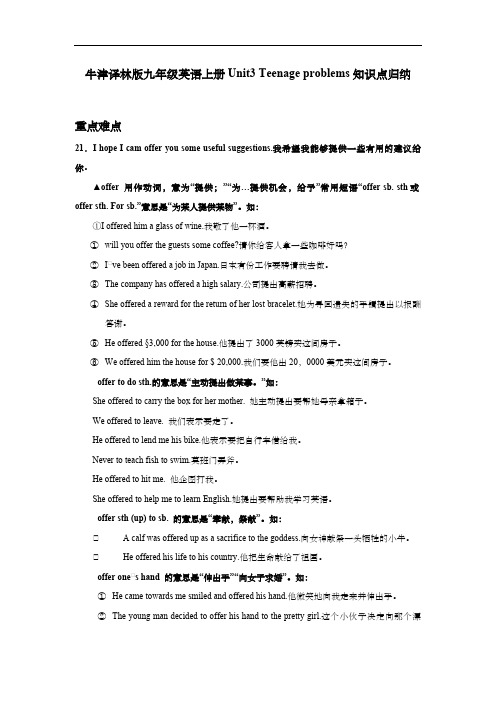
⑥ We offered him the house for $ 20,000.我们要他出 20,0000 美元买这间房子。
offer to do sth.的意思是“主动提出做某事。”如:
She offered to carry the box for her mother. 她主动提出要帮她母亲拿箱子。
② Can you suggest how we might solve the problem?怎样解决这问题,你能出个主意 吗?
③ He suggested taking the children to the zoo.他提议带孩子去动物园。 ④ They accepted the paper and suggested only one change.他们接受了这篇文章,只提
牛津译林版九年级英语上册 Unit3 Teenage problems 知识点归纳
重点难点
21.I hope I cam offer you some useful suggestions.我希望我能够提供一些有用的建议给
你。
▲offer 用作动词,意为“提供;”“为…提供机会,给予”常用短语“offer sb. sth 或
We offered to leave. 我们表示要走了。
He offered to lend me his bike.他表示要把自行车借给我。
Never to teach fish to swim.莫班门弄斧。
He offered to hit me. 他企图打我。
She offered to help me to learn English.她提出要帮助我学习英语。
③ The company has offered a high salary.公司提出高薪招聘。
牛津译林版英语九上Unit 3 Teenage problems
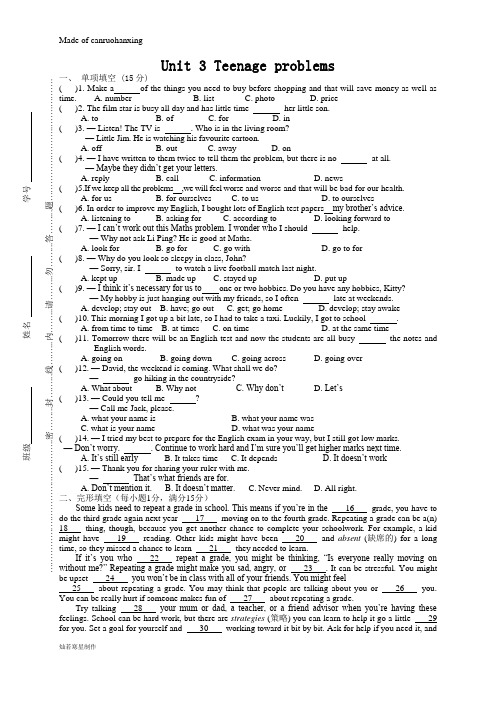
Unit 3 Teenage problems一、 单项填空 (15分)( )1. Make a of the things you need to buy before shopping and that will save money as well as time. A. number B. list C. photo D. price( )2. The film star is busy all day and has little time her little son.A. toB. ofC. forD. in( )3. — Listen! The TV is . Who is in the living room?— Little Jim. He is watching his favourite cartoon.A. offB. outC. awayD. on( )4. — I have written to them twice to tell them the problem, but there is no at all.— Maybe they didn’t get your letters.A. replyB. callC. informationD. news( )5.If we keep all the problems ,we will feel worse and worse and that will be bad for our health.A. for usB. for ourselvesC. to usD. to ourselves( )6. In order to improve my English, I bought lots of English test papers my brother’s advice.A. listening toB. asking forC. according toD. looking forward to( )7. — I can’t work out this Maths problem. I wonder who I should help.— Why not ask Li Ping? He is good at Maths.A. look forB. go forC. go withD. go to for( )8. — Why do you look so sleepy in class, John?— Sorry, sir. I to watch a live football match last night.A. kept upB. made upC. stayed upD. put up( )9. — I think it’s necessary for us to one or two hobbies. Do you have any hobbies, Kitty?— My hobby is just hanging out with my friends, so I often late at weekends.A. develop; stay outB. have; go outC. get; go homeD. develop; stay awake( )10. This morning I got up a bit late, so I had to take a taxi. Luckily, I got to school .A. from time to timeB. at timesC. on timeD. at the same time( )11. Tomorrow there will be an English test and now the students are all busy the notes andEnglish words.A. going onB. going downC. going acrossD. going over( )12. — David, the weekend is coming. What shall we do?— go hiking in the countryside?A. What aboutB. Why notC. Why don’tD. Let’s( )13. — Could you tell me ?— Call me Jack, please.A. what your name isB. what your name wasC. what is your nameD. what was your name( )14. — I tried my best to prepare for the English exam in your way, but I still got low marks.— Don’t worry. . Continue to work hard and I’m sure you’ll get higher marks next time.A. It’s still earlyB. It takes timeC. It dependsD. It doesn’t work( )15. — Thank you for sharing your ruler with me.— That’s what friends are for.A . Don’t mention it. B. It doesn’t matter. C. Never mind. D. All right.二、完形填空(每小题1分,满分15分)Some kids need to repeat a grade in school. This means if you’re in the 16 grade, you have to do the third grade again next year 17 moving on to the fourth grade. Repeating a grade can be a(n) 18 thing, though, because you get another chance to complete your schoolwork. For example, a kid might have 19 reading. Other kids might have been 20 and absent (缺席的) for a long time, so they missed a chance to learn 21 they needed to learn.If it’s you who 22 repeat a grade, you might be thinking, “Is everyone really moving on without me?” Repeating a gr ade might make you sad, angry, or 23 . It can be stressful. You might be upset 24 you won’t be in class with all of your friends. You might feel25 about repeating a grade. You may think that people are talking about you or 26 you. You can be really hurt if someone makes fun of 27 about repeating a grade.Try talking 28 your mum or dad, a teacher, or a friend advisor when you’re having these feelings. School can be hard work, but there are strategies (策略) you can learn to help it go a little 29 for you. Set a goal for yourself and 30 working toward it bit by bit. Ask for help if you need it, and 班级 姓名 学号…………….……………..…………..密……...封……...线……...内……...请……...勿……...答……...题……………………..…….……….you’ll get there!( )16.A. first B. second C. third D. fourth( )17. A. except B. besides C. for D. instead of( )18. A. wrong B. right C. easy D. difficult( )19. A. trouble B. fun C. practice D. secret( )20. A. ill B. afraid C. healthy D. silly( )21. A. much B. everything C. none D. anything( )22. A. can B. can’t C. must D. mustn’t( )23. A. neither B. all C. each D. both( )24. A. so B. because C. but D. though( )25. A. shy B. excited C. happy D. afraid( )26. A. caring about B. looking after C. laughing at D. replying to( )27.A. himself B. him C. yourself D. you( )28. A. with B. for C. about D. against( )29. A. worse B. better C. later D. earlier( )30. A. stop B. give up C. keep D. make up三、任务型阅读(注意:每空一词)。
- 1、下载文档前请自行甄别文档内容的完整性,平台不提供额外的编辑、内容补充、找答案等附加服务。
- 2、"仅部分预览"的文档,不可在线预览部分如存在完整性等问题,可反馈申请退款(可完整预览的文档不适用该条件!)。
- 3、如文档侵犯您的权益,请联系客服反馈,我们会尽快为您处理(人工客服工作时间:9:00-18:30)。
②no longer know when to cook and wake Mr. Jiang up at4 inthe morning.
③Find his bre akfast in the washing machine, clean shirts in the dustbin, books in the sink .
集体智慧
(以知识体系为主)
个性设计
(二次备课)
教学后记
Step1 Revision
Revise the new words and expres sions by having a dictation.
Remember the new words and expressions that we
learnt yesterday by having a dictation.
2.Check the answers.
3.Ask t he students to d o t he exercise of Part C at page 27.
Ste p4 Language points
1.be happy with = be satisfied/pleased with
2.wake sb. up
Ask students to listen to the passage, paying a ttention to the pronunciation, and make some of them to read the paragraphs aloud.
2. List the bad p oints.
Ask students to read each paragraph and put rward questions if they have.
I will help them if they need.
语言点总结较好,鼓励学生多理解
针对语言点还应多做练习。
练习安排
1.Recite the new words and related paragraphs.
Step 2 learning
1,Explain the context of the second part of the r eading passage.
Daniel is reading an article ab out having a robot at home. There are bad point s.
2.Preview the vocabulary.
板书设计
Words phrases sentences
备课组长审核签名:年级主任复核签名:
unit3 reading2
教学
目标
To identify true or false statements abou t life with a r obot.
重点难点分析
To identify true or false statements about life with a robot.
教学流程安排
3. in the end = at last= finally
4. return sth. to sb.= give sth. back to sb.
5. decide to do sth.
Ask students to listen to the passage, paying attention to the pronunciation, and make some o f t hem to read the paragraphs aloud.
④ Move around the house and knock things over
Step 3.Exercise
1.Ask t he students to have a discussion about B2.
Generalize the goo d points and bad points about the robot.
